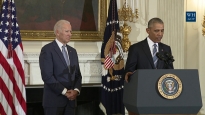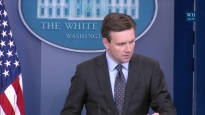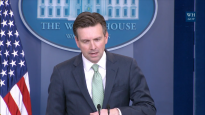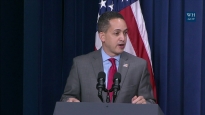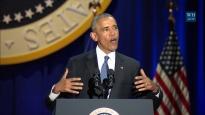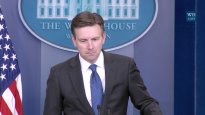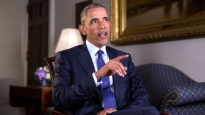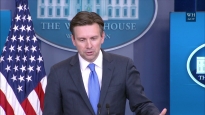Press Briefing
June 15, 2012 | 41:37 | Public Domain
White House Press Briefings are conducted most weekdays from the James S. Brady Press Briefing Room in the West Wing.
Press Briefing by Lael Brainard, Mike Froman, and Ben Rhodes Previewing the G20 Summit
James S. Brady Press Briefing Room
12:10 P.M. EDT
MR. CARNEY: Good afternoon, ladies and gentlemen. Thank you for being here. As you know and has been announced, we have three guest briefers today, and I will turn it over to them shortly. On my near right is Lael Brainard, Under Secretary of the Treasury for International Affairs. To her right is Michael Froman, Deputy Assistant to the President and Deputy National Security Advisor for International Economic Affairs. And of course you know Ben Rhodes, Deputy National Security Advisor to the President for Strategic Communications.
I think Ben will probably open and then they'll be available for your questions about the upcoming G20 summit. And I'll turn it over to Ben with that. Thank you.
MR. RHODES: Thanks, everybody. I'll make a few opening comments, run through the President's schedule. Then Mike can speak about the G20 agenda, and Lael can speak a little bit more about our efforts to support progress in the global economy.
The President will be going down to Los Cabos on Sunday night. Monday morning, he'll begin around 9:00 a.m. with a bilateral meeting with President Calderón of Mexico. Of course, President Calderón is hosting the summit, so this is a chance for the two leaders to check signals about the summit agenda. They had a phone call recently where they were able to do that.
Also, of course, the United States and Mexico are close partners on economic and security issues. President Calderón is nearing the end of his term in office, so it's a good opportunity for the two leaders to recap the progress that they've made together and to look forward in the U.S.-Mexico relationship.
Then later that morning, the President will have a bilateral meeting with President Putin of Russia. This is his first bilateral meeting with President Putin since President Putin was elected and inaugurated. Expect that the agenda for the meeting will cover a range of issues. We continue to have good cooperation with Russia on Afghanistan and the supply of our troops there.
The P5-plus-1 talks with Iran will be taking place at roughly the same time as the G20 in Moscow. Russia has been united with the rest of the P5-plus-1 through that process in working to get Iran to live up to its international obligations, so Iran will be a subject.
Deepening economic cooperation between the United States and Russia in commercial ties will certainly be on the agenda as well, given Russia's accession to the WTO, our continued efforts, again, to get greater access for U.S. businesses to Russian markets.
Syria, of course, has been a point of difference between the United States and Russia over the course of the last several months. However we've been working to see if we can move forward in a common position with the international community in support of a political transition within Syria. Obviously the United States believes that President Assad would need to step down as a part of that transition. Syria will certainly be on the agenda of their meeting as well.
Of course, when the United States and Russia get together, there will be a broad range of other security issues that will be on the agenda.
Following the Russia bilat, the President, later that afternoon, will move into the G20 sessions. There's an opening plenary session and a working dinner that night where the leaders will discuss the global economy.
The next day there are G20 sessions throughout the day on Tuesday. Following the conclusion of the G20, at around 3:30 p.m., the President will have a bilateral meeting with President Hu Jintao of China. This will be I think the 12th meeting between President Obama and President Hu. They will have a chance the review the progress that was made at the G20 on the global economy -- China being, of course, one of our key partners in coordinating action to sustain global growth that is balanced and sustained.
They'll also discuss, I'm sure, a range of security issues -- North Korea, Iran in the context of the P5-plus-1 talks, as well. So I'm sure it will be a broad discussion with President Hu.
Following that meeting, President Obama will have a press conference, and then we will return home here to Washington late that night.
Of course, in any G20 there are additional discussions that take place on the margins of the meeting, so I’m sure he’ll have an opportunity to interact with a range of other leaders over the course of the two days. But why don’t I turn it over to Mike who can walk you through the G20 agenda in some greater detail, and then Lael, again, to speak in more detail about the global economy.
MR. FROMAN: Thanks, Ben. This is the sixth G20 that the President will attend. And since its foundation, the G20 has established a pretty solid track record of contributing to the efforts to avoid a global depression back in ’08, ’09 that would have destroyed tens of millions of jobs and businesses; putting in place a framework for strong, balanced and sustainable growth with the goal of rebalancing demand around the globe; updating the financial regulatory system around the world and reforming the international financial institutions; addressing major challenges to international development, including food security and infrastructure; and maintaining an open trading system despite -- or in the midst of the most serious economic crisis in 80 years.
It’s launched a major effort on anticorruption and taken on critical issues around energy security, including the phasing out of inefficient fossil fuel subsidies. And it’s underscored the importance throughout of growth and policies to support the maintenance and creation of decent jobs.
Under the leadership of the Mexican presidency, the G20 has continued this agenda. Mexico has put an emphasis on the role that green growth can play as part of the global recovery, both to create jobs and deal with the challenges of energy security and climate change.
It’s taken forward the G20’s development agenda with a particular focus on food security and infrastructure, and on financial inclusion -- that is the expansion of access to savings, credit and insurance to a greater percentage of the world’s population.
There has been strong progress on anticorruption and on inefficient fossil fuel subsidy phase-out. But these summits really have three main purposes. First, they are opportunities for leaders to engage directly with their counterparts on a whole range of issues, particularly around the global economy, but the broader agenda as well. And President Obama, as Ben has said, will certainly do that both in his bilateral meetings and on the margins of the plenary sessions themselves. In fact, often the most important work is done outside the formal sessions of the G20.
Second, there are action-enforcing events which drive member governments to reach agreements on a variety of topics and some that require the direct involvement of their leaders and some that don’t. And next week there will be announcements on progress in a number of areas, including financial regulatory reform, international financial architecture issues that Under Secretary Brainard will talk about, but also other global issues as well.
And third, there are moments when leaders come together to address the critical issues of the day. And that’s where the G20 -- where having the participation of the largest economies around the world at the G20 makes that the most appropriate forum to do so because you have all the relevant leaders at the same place and at the same time.
Obviously, the situation in Europe will be central in leaders’ minds when they arrive in Los Cabos. It’s the dominant risk to the global economy at the moment. And Europe is our largest trading partner and a key part of the global financial system, and therefore it's very important to the United States, and the rest of the world as they work through their issues.
As a result, the overwhelming focus of this G20 is likely to be how to promote and maintain global economic growth. Because the stakes are so high, throughout this crisis, the President, Secretary Geithner, Under Secretary Brainard and some of us here at the White House have been in close contact with our European counterparts to discuss approaches to the crisis, to share our own experience in the United States and to offer our support.
And what the Europeans have made clear is that they believe it's in their collective responsibility to do what it takes to keep the eurozone together. They've already taken a number of difficult decisions that have made important progress, and they have substantial resources to address their issues. But they also recognize that there is still work to be done. Reaching agreement among the 17 -- or 27 countries on difficult economic issues is, as Chancellor Merkel said yesterday in a speech, a herculean task.
At Los Cabos, the G20 looks forward to hearing more from the European leaders on the progress of their efforts to stabilize their banking system and promote growth, and to hear what their vision is for taking this effort forward toward fiscal and financial union. That being said, Los Cabos will not be the final word on the eurozone. That is a continuing conversation with some important milestones, including a meeting of all EU leaders coming up in Brussels at the end of the month.
For our part, the United States will continue to provide leadership -- global leadership in terms of strengthening the global recovery. President Obama is intensely focused on creating jobs, and that's why he has put forward proposals to cut taxes for small businesses hiring, to help families refinance their homes, to invest in infrastructure and to put teachers, firefighters and police officers back to work. He has also proposed a framework to put our medium-term public finances on stronger, more sustainable footing as well. That's why the jobs plan he put forward in September was pared with a $4 trillion long-term deficit reduction plan.
The President's approach of spurring job creation and growth in the near term, and meaningful deficit reduction in the medium term represents the best policy to protect the U.S. economy and to do our part as the world's largest and most important economy to maintaining the global recovery.
UNDER SECRETARY BRAINARD: As you know, G20 leaders are coming to Los Cabos at a challenging time. Euro area fragility remains the key risk to our recovery and to the global economy. Europe is our largest export market, so weaker demand in Europe means weaker job growth here at home. European banks are interconnected with financial markets around the world, so volatility in Europe undermines sentiment here at home. For that reason, Europe will be at the center of discussions in Mexico.
Los Cabos provides a timely opportunity for European leaders to update on their progress and to serve as a catalyst for future action, looking ahead to their council meeting at the end of June.
European leaders have told us they are committed to do whatever it takes to strengthen their monetary union. They're currently focusing on four important areas to escalate their response. First, European leaders are working to lay out a path to financial union, which is a necessary complement to monetary union. A more centralized framework for supervision and resolution will permit greater risk-sharing on bank capital and deposition insurance, which are critical for confidence. As our experience here, what the FDIC has shown, these elements are critical threads in the financial sector safety net.
Spain's commitment to recapitalize its banks is a key step on this path and further clarity will be important in the days ahead.
Second, euro area authorities continue to make their financial backstops more effective and more credible in the face of market pressures. Spain and Italy are undertaking difficult, important long-term reforms, and it will be important that they continue to borrow at affordable rates as they undertake those reforms.
Third, there's a growing recognition among European leaders of the importance of supporting growth in the face of a weaker outlook. This includes support for investments in infrastructure as well as recalibration of fiscal consolidation paths to take into account cyclical conditions.
And finally, European leaders face a challenging situation in Greece. It's a very complex political situation and the Greek people face difficult decisions. It's in everyone's interest for Greece to remain in the euro while respecting its commitments, and for European partners to work together to put the Greek economy on a sustainable path.
Beyond the events in Europe, growth in many key emerging markets is also flagging. Many of these countries, such as China, have the fiscal and monetary capacity to take actions to spur domestic demand and to help support global growth. The G20 will look to maintain momentum on rebalancing demand, which is critical to stronger overall growth. And key, of course, to achieving this, among other things, is for China and other surplus emerging market economies to take fiscal and other measures to support domestic consumption as well as allowing exchange rates to reflect market forces.
Leaders will be able to point to significant progress on global financial reform in Los Cabos. We, of course, continue to lead on this area with implementation of the Dodd-Frank Act, and we're going to see continued movement from all our G20 partners on implementation in key areas, such as over-the-counter derivatives and cross-border bank resolution.
And of course, the President will make clear that his top priority here at home remains boosting growth and getting Americans back to work.
In short, the focus of Los Cabos will be supporting growth and ensuring our European partners are escalating their response to reinforce financial stability, recognizing the stakes are high for all of us.
MR. RHODES: With that, we'd be happy to take your questions.
Q Can you just sort of bottom-line this for us? Since the President doesn’t have the ability to really get Europe to do any of the worthy things you've outlined here, what's a good outcome for the G20 from your perspective? What can we actually -- what does the United States really actually want to get out of the G20?
UNDER SECRETARY BRAINARD: The President has understood from day one how important the stakes are for the world and for us here at home, and he's been deeply engaged, and as was said earlier, Secretary Geithner has been deeply engaged, and a whole host of officials across the administration have continued to work very closely with European partners.
What we expect to see at Los Cabos is European leaders articulating how they're going to move forward on escalating their response to the crisis. And of course, the catalyst for action, looking forward to their meeting later this month, and the actions that we're looking forward to hearing more about and that he has been talking to European leaders about are areas like moving forward on banking union, working to reinforce their firewalls, working to reinforce and recalibrate the path of fiscal consolidation to support growth, and charting a sustainable path forward on Greece.
MR. FROMAN: Just to add to that, because I think the overwhelming focus of this G20 is going to be reflecting the evolving debate around growth and the critical importance of global growth and global recovery. And the European piece is the most central piece at the moment in that effort.
But as Lael laid out before, there are emerging economies that are also slowing down that can take further action. We have our role to play in managing a pathway towards medium-term fiscal sustainability.
And so coming out of the G20, I think a unified message about the importance of growth, what all of us can do to contribute to that, and most importantly, what European can do in terms of laying out a vision for how it's going to resolve its part of this crisis is our hope for an outcome.
Q What can the G20 and the United States do on Monday to calm markets and the effect of a funding freeze after the Greek elections?
UNDER SECRETARY BRAINARD: First of all, it's important to recognize that we are hearing from both our European partners and from the main candidates in Greece, from the Greek people that they are all looking to find a path forward that will keep Greece in the euro area even as Greece moves forward on reforms. I think it may take a little time to see the full outcome of the Greek elections, given it's a parliamentary system, but obviously we will be in close discussions with our European partners.
And again, there is a commitment on both sides to look for a path forward to help Greece meet its commitments, keeping Greece in the euro area while recognizing that the Greek people are facing very challenging economic circumstances.
Q But are there measures that can be taken, or words that can be said, on Monday to give confidence to markets after that election?
UNDER SECRETARY BRAINARD: So I would anticipate that as the election outcome is clearer and that as the parties in Greece work to form a government, that we'll hear from our European partners on their plans to sit down with the Greeks, and again, to find a path forward that recognizes the adverse economic circumstances in Greece, but of course, it's very important that Greece move forward on its reforms.
And European partners have been working very closely together on this, as have we, in conversations with our European friends. And so I think everyone is well prepared to, in the wake of the elections on Greece, to work together to make sure there's a path forward that's sustainable for Greece and bolsters confidence more broadly.
Q Just one follow-up for Mike, if I could. The G8 had a fairly robust statement about oil reserves. Will that issue be discussed at the G20?
MR. FROMAN: I think as part of the discussion of the global economy, obviously energy issues will fit into that, and it tends to be part of the broader discussion. We don't expect it to be a major focus of the discussion there at the moment, but we do -- I'm sure it will be part of the overall economic discussion.
Q Can I ask you about the President's bilat with Russian President Putin? There's a report this morning that Moscow has sent a ship that has combat forces to guard their deepwater port -- are we concerned about that?
MR. RHODES: I've seen those reports. We obviously have to take a closer look at them to understand exactly what's taken place. Russia has a port that they transited through in the past. So I can't get into any specific detail on that right now. I have to run down that report and have a fuller understanding of what exactly is taking place.
Q You mentioned that German Chancellor Angela Merkel yesterday said -- called the crisis herculean. And I'm wondering if you could comment on some of the other things that she said in that speech -- essentially saying that she opposes easy solutions that risk backfiring, and that Germany's power is not infinite and so its responsibility is to deploy our strengthen credibly so we can be of full use to Europe. How do you interpret the message that she was sending yesterday?
UNDER SECRETARY BRAINARD: I think we've seen a number of statements from European leaders, and again, we expect to hear more of this in Los Cabos, showing that they are fundamentally committed to evolving the euro area in a way that makes the monetary union much stronger by virtue of having a more banking union, more fiscal union, more political union.
Obviously these are steps that will take some time, but what we, I think, recognize is that no one country is going to be able to undertake that on their own, and the euro area countries are going to work together to find a path on banking union, for instance, that involves risk-sharing across the euro area and backstops the banking system across the euro area with centralized supervision and regulation. And you have to put this in the context that Europe has already taken really quite remarkable steps. I mean, we forget that when they started with this crisis they really had no firewall at all, and they've moved together to put in place very substantial resources to protect the economies in Europe and to ensure that sovereigns continue to have access to financing. The ECB has taken very important actions to inject liquidity into the banking system.
And so what we're seeing is a continued willingness on the part of European leaders to take those actions. And again, we're going to look forward to hearing from them, and the President is deeply engaged in encouraging them to lay out the next steps in the escalation of their response.
Q Two questions. One, can either or both of you comment on the action that the UK took yesterday? And then, has the U.S. prepared a contingency plan in the event that there is some negative global market reaction on Monday?
And for Ben, on the meeting with Putin and Syria, do you guys consider the standoff with Russia over Syria as marking the death of the reset with Russia?
MR. RHODES: I'll take the second one first. I'd say a couple things. First of all, the reset with Russia was based on the belief that we could cooperate with them on areas of common interest, understanding that we'd still have some differences. And I think we continue to see very positive results from that reset policy. We supply our troops in Afghanistan significantly through the Northern Distribution Network that passes through Russia, so Russian cooperation in Afghanistan is essential to, again, supplying our troops.
We've worked with Russia on the Iran issue, and they've joined us in U.N. Security Council Resolution 1929, which is the foundation of all the sanctions that we then moved on to put in place on the Iranian government. Russia has been with us in the P5-plus-1 talks, for instance, in sending a clear message to Iran that they need to live up to their international obligations, and is, in fact, hosting the next round of those talks in Moscow.
On nuclear issues -- our efforts to lock down nuclear materials around the world depend in large part on effective cooperation between the United States and Russia, and other countries. And again, our dialogue with the Russians in the New Start Treaty allows us to have a verifiable mechanism for reducing our deployed nuclear missiles and launchers.
So, in other words, we're able to work with the Russians and cooperate on a set of issues even though we have differences. And it's our view that just because you have difference on certain issues doesn’t mean that you want to throw aside the very substantial cooperation that we're getting with the Russians, again, on issues from Afghanistan to Iran to nuclear security.
However, we have had a very substantial difference with Russia on the issue of Syria. And essentially, our view for some time now has been that Bashar al-Assad has no legitimacy to lead that country anymore. He's lost that legitimacy by the actions he's taken, the violence he's committed against his own people, and therefore he needs to step down from power. That’s been the U.S. view for some time now, as long -- as well as many other countries around the world because we believe that’s what the Syrian people have indicated that they want.
So we've worked through the U.N. Security Council to try to take action to put pressure on the Assad regime, to send a clear message that there needed to be change within Syrian. The Russian government did not support those efforts and blocked two resolutions at the U.N. Security Council. However, they have, again, been a part of the Annan plan that puts forward a road map that could allow for an end to the violence in Syria and a political transition.
However, it's our assessment that the Syrian government has not met its commitments -- any of its commitments -- under the Annan plan, and therefore, what we need to do to preserve the credibility of that effort is to lift up the political transition and say this has to be about more than simply getting monitors into the country; this has to be about holding the government to account for its actions, and also showing the Syrian people that there is going to be a political transition that gets underway that involves real change in the country. And we have held up, for instance, the model of Yemen, where you had a leader step down from power in an orderly fashion and then a road map towards elections.
And we've been working to get the Russians to come in line with, frankly, the broad international community. This is not just an issue between the United States and Russia; it's really an issue between the international community, on the one hand, that is expressing support for a real transition in Syria, and the Syrian government, which has, of course, resisted those steps.
So we'll continue to work through that area of difference with the Russians because we believe that they can play a role, again, in pressing the Assad regime and supporting a political transition. And that will be on the agenda.
And even as we do that with Russia, we have the "Friends of Syria" group, where we are working with like-minded nations -- European partners, Arab partners, Turkey -- to put pressure on the Assad regime, to impose sanctions, and to support a transition and support the Syrian opposition. We'll continue to do that. And if there is not progress made, we have been clear that we can continue to have discussions at the U.N. and the Security Council about what additional steps need to be taken.
So we’ll continue with the progress that’s been made on the reset. And what we’ve shown is we can have strong differences, we can articulate those differences, but it need not derail cooperation in other areas.
On the other question -- let me just turn it over to Lael.
UNDER SECRETARY BRAINARD: I think it’s important to recognize -- the President recognized very early on that we needed to help insulate our economy, we needed to provide an insurance policy; that our recovery was still quite vulnerable to headwinds from Europe. And that’s why he worked so hard to put in place an economic plan that would provide support for demand in the short run, at a time when demand is exceptionally weak in Europe and in other parts of the world, while working on a medium-term plan to put our public finances on a sustainable path, a balanced plan.
It’s why early on, you’ll recall, he undertook a stress test that ensured that our capital in our banking system was greatly increased so that our banking system today is much better prepared for any kind of shocks that it may encounter. That’s why he pushed so hard for Dodd-Frank, which both strengthens the supervision and regulation of our financial system, but also ensures that our regulators and supervisors have the tools they need to ensure the resilience of the banking system.
So early on, he put out an approach that really does bolster demand, bolster growth, bolster job creation. And we’re seeing other countries now coming around and also recognizing they need to do more to insure their economies from these risks.
Q Going back to Russia, you guys have said that the reset wasn’t based on personalities but based on issues. But at the same time, it’s obvious that Putin doesn’t have the same kind of sunny sort of assessment of U.S.-Russia interests that Medvedev did, so surely that’s going to impact that relationship in some way. And how do you expect the tone of this meeting to go?
MR. RHODES: Well, look, we’ve always said it’s an interest-based relationship and that, frankly, we weren’t going to have a relationship that depended overly on personalities, because what we wanted to do is build a foundation of common interest that could sustain progress.
President Medvedev did have a very good and close personal rapport with President Obama that continues, and that was certainly that case at the G8. I’d say a couple of things, though. First of all, we don’t attribute that progress that’s been made over the course of the last several years just to that personal rapport. It’s a lot of hard, technical work that was done, in many respects, to get the New START Treaty done or to get the Northern Distribution Network set up.
Secondly, Prime Minister Putin, as Prime Minister, was certainly an influential figure within Russia during the time of the reset. So given his influence within Russia and its system, even as President Medvedev was of course the leader of the government, our assessment is that Prime Minister Putin was supportive of the reset as it unfolded over the course of the last several years.
Then I'd also say that President Putin has indicated that he is in full agreement with the policies that President Medvedev undertook as it relates to the reset and that, frankly, he wanted to continue the cooperative nature of the relationship in a set of areas. So in the initial phone calls that President Obama has had with President Putin, the indication that we've given and that the Russians have provided is that we want to continue to build on the common ground that we've had.
That said, President Putin clearly is somebody who can articulate where he has differences with the United States, but we can also articulate where we have differences with Russia. And I think our assessment is that being candid with one another and clear with one another is in the best interest of the relationship. So I expect that it will be a candid discussion, it will get down to business, that we'll be able to sustain cooperation in some areas, we'll have differences in other areas. And we'll work to try to bridge those differences, because the relationship between the United States and Russia is in our interest, it's in Russia's interest, but also it's in the interest of the world community, because when we can work together on issues, again, it opens up the door to much better progress, whether you're talking about nonproliferation and nuclear security, whether you're talking about resolving regional tensions as in Syrian, or whether you're talking about the global economy.
Q Just to follow, could the U.S. live with a Syria that is not ruled by Assad, but retains a kind of close, strategic relationship with Russia?
MR. RHODES: We have certainly made clear that our interest in Syria is not the end of any kind of Russian influence. Our interest in Syria is an end to the violence that's being committed against the Syrian people, and a government that reflects the will of the Syrian people. We think that it's absolutely necessary, for that to happen, to see Bashar al-Assad leave power. That’s the one point that we've made -- and that there then must be a process that, again, is responsive to the democratic will of the people.
But, again, if Syria continues to have a relationship with Russia, if Russia continues to have, again, a close relationship with the future government of Syria, that would be in the natural decision-making of two sovereign nations. And it's not our goal in Syria to eliminate Russian influence. Our goal in Syria, again, is to stop the violence and to start a transition and have a government that is reflective of the democratic will of the people of that country.
Q Lael, isn't the global and the U.S. economy basically at the hands of Germany at this point? The U.S. really has no leverage to use at the G20, other than peer pressure? I mean, does it have any leverage at all, say, use of IMF resources?
UNDER SECRETARY BRAINARD: The President and his economic team have been working very closely with their European partners. We obviously bring a lot to the table, in terms of our own experiences, and the tools and approaches we have used in our own financial crisis, which has put our economy on a much stronger path today than it was on when we first came into office. And, of course, we've seen European crisis response evolving in directions that reflect that. But of course, it's going to be important for European leaders to set out their broader path to greater banking union. Again, it's very important to see risk-sharing, backstopping of the banking system to greater fiscal union. And so, in the days ahead, that is really where our focus will be.
By the same token, the President has been working very hard here at home. At the end of the day, that is what matters most for jobs and growth here at home. And we are seeing some progress on that front, although we need to see much stronger action domestically to bolster job growth in the months ahead and, again, in part to make sure that our economy is more resilient to any kind of shock that could emanate from abroad.
MR. CARNEY: Go ahead, Mike, and then we're just going to have time for a couple more.
MR. FROMAN: Let me just -- to add to that just two points. One is, this is not an issue of U.S. leverage. It's Europe doing what's in Europe's interests and what's in the interest of the rest of the global economy. But let me also just underscore this isn't a meeting where we expect Europeans to make decisions about Europe. You'll have four out of 17 eurozone members there. You'll have five out of 27 European Union members there, plus of course President Van Rompuy and President Barroso.
So this is an opportunity -- and we'll be encouraging them to take this opportunity -- to lay out a vision of where they want to take Europe and the eurozone going forward, and how they want to address these issues. But this is not a meeting where we expect them to come and make decisions for all of Europe.
MR. CARNEY: I just want -- you all have a call to the Rose Garden. So we just -- Ben will call on people, but we've got to wrap it up in the next couple of minutes.
MR. RHODES: I'll take a couple of more here, yes.
Q Thank you. I wanted to follow up on the Russian thing. Do you expect any deliverables out of the meeting of the two Presidents? Frankly, my own feeling about this is that we have a pause in the relationship, and it has nothing to do with external things like Syria or others, but more maybe with the difficult political season in the U.S. So do you expect real progress in any areas this year?
MR. RHODES: Well, we'd absolutely like to see progress in a set of areas. Again, on Iran, the Russians are deeply invested in progress in the P5-plus-1 talks, not just as a member of the P5-plus-1, but as the host nation for the next round of those talks. And so we'll want to be coordinating with the Russians and the rest of our P5-plus-1 partners to see progress in getting Iran to live up to its obligations.
On Syria, we would like to see Russia as a part of an international effort to support a political transition within Syria that's entirely consistent with the Annan plan that speaks about a political transition. So we believe there's space for agreement. But, again, our view is that political transition has to involve Bashar al-Assad leaving power.
On commercial ties, we're actually in agreement in seeking greater access to Russian markets for U.S. businesses, on seeking the repeal of Jackson-Vanik, for instance, to facilitate that effort. So I think there is areas of agreement and areas where we'd like to make progress, even though we recognize there have been difficulties and tensions in aspects of the relationship in recent weeks.
Q Two questions. One, this week, a high-level U.S.-India strategic dialogue took place in Washington, and yesterday, the President called the Prime Minister of India, Mr. Singh. What role the President played in those talks here? And also, they’re going to meet in Mexico one-on-one. And second, my question on the corruption -- as far as corruption is concerned, trillions of dollars are sitting in Swiss banks, which are not -- there is no -- it’s from the terrorists and also from corrupt Indian politicians. And Indians are asking U.S. help now to bring those trillion dollar-plus in the Swiss banks back to India because of the illegal money, which is used by terrorists.
MR. RHODES: I’d just say a couple of things. First of all, I think we were able to have a consultation here between the United States and India over the course of the last two days. President Obama spoke to Prime Minister Singh. They talked about the G20 agenda. I think they’re in broad agreement about the need for there to be steps to promote global growth, about the need to have European leaders use the G20 as an opportunity to discuss their plans around the eurozone. So I think that call was very much about coordinating efforts leading into the G20.
At the same time, we’ve continued our strategic dialogue with India that runs across a range of different sectors. We want to see deeper strategic cooperation between our two countries, for instance, as we deal with the future security of South Asia and Afghanistan as the United States draws down there. We’d like to see deeper economic cooperation, including increased exports and commercial ties with India. And that’s something that was discussed in recent days, and the President is personally very supportive of those efforts.
I think he’ll have a chance to see Prime Minister Singh on the margins of the G20. In the context of leaders speaking, there is not a formal bilateral meeting planned.
On corruption, I’d just say we have been supportive of efforts within India to crack down on corruption. The G20 also has been a forum that we’ve used to lift up the issue of corruption so that countries can share best practices and join cooperative efforts to combat corruption.
Q Can you just clarify that the U.S. has no emergency contingency plan should the euro crisis devolve -- should we go over the precipice? I know you said the U.S. has been insulating itself, preparing itself, but can you just confirm that the Treasury and the White House has no special contingency plan for this?
UNDER SECRETARY BRAINARD: Let me just say first, again, it’s important to recognize that we will look forward to learning about the outcomes of the Greek elections, but we already are seeing substantial indications on the part of European partners who we’re very engaged with, on the part of many of the political leaders in Greece, that everyone recognizes that Greece needs to find a path forward within the euro area, and Greece needs to find a path forward that continues to undertake the difficult reforms while receiving support from its European partners in the broader international community.
Separately, of course, we are, across the U.S. government, always making sure that we have a toolkit and that we are well prepared for any set of exigencies that may arise. And so, of course, there is a set of tools that are well understood, and there is always, in any time period, readiness.
But I want to go back to the basic point, which is we’re going to hear from European partners in Los Cabos. They’re very focused on restoring confidence, charting a path forward that contributes to financial stability. And one of the core elements is to make sure that Greece is on a sustainable path while respecting its commitments within the Euro area.
Q There is a follow-up to that.
MR. CARNEY: This is going to have to be the last one only because the President does have an event and we need to move folks there. And I’ll read the week ahead.
Q Would the U.S. be supportive of some form of central bank joint intervention if the outcome of the Greek election causes more market turmoil? And what is the role of the central banks in this?
UNDER SECRETARY BRAINARD: So, of course, we would refer you to the Federal Reserve on that issue.
Q Can I ask on China?
MR. CARNEY: I think we’re going to have to wrap it up just because the President does have an event. I have a week ahead to read. I want to thank our participants today and thank you for your questions. I’ll provide you a week ahead schedule for the President for next week.
As you know, on Monday and Tuesday -- and if this is news to you, you weren’t listening -- the President will be at the G20 summit in Los Cabos, Mexico. The President will return to Washington, D.C. on Tuesday evening.
On Wednesday and Thursday, the President will attend meetings here at the White House.
On Friday, the President will travel to Orlando, Florida, to deliver remarks at the National Association of Latino Elected and Appointed Officials Annual Conference. The President will return to the Washington, D.C. that evening.
And that’s your week ahead. Thank you all very much.
END
12:52 P.M. EDT
|
January 12, 2017
|
January 12, 2017
|
January 11, 2017
|
January 11, 2017
|
|
January 10, 2017
|
January 9, 2017
|
January 7, 2017
|
January 6, 2017
|
- &lsaquo previous
- 1
- 2
- 3
- 4
- 5
- 6
- 7
- 8
- 9
- …
- next &rsaquo
